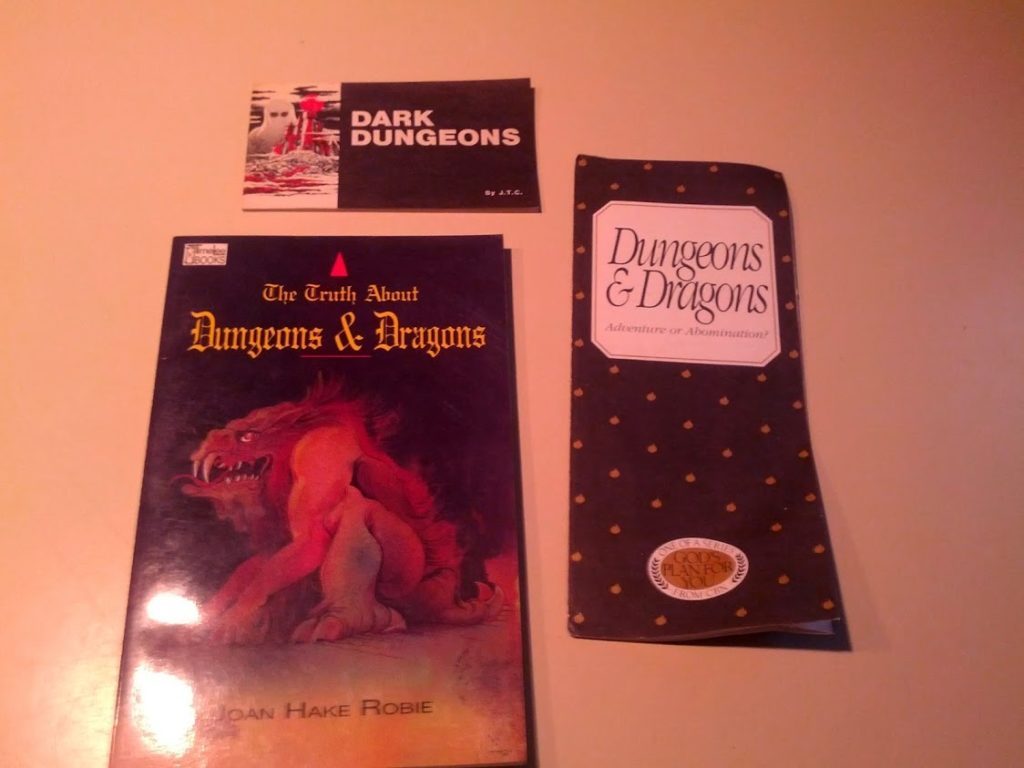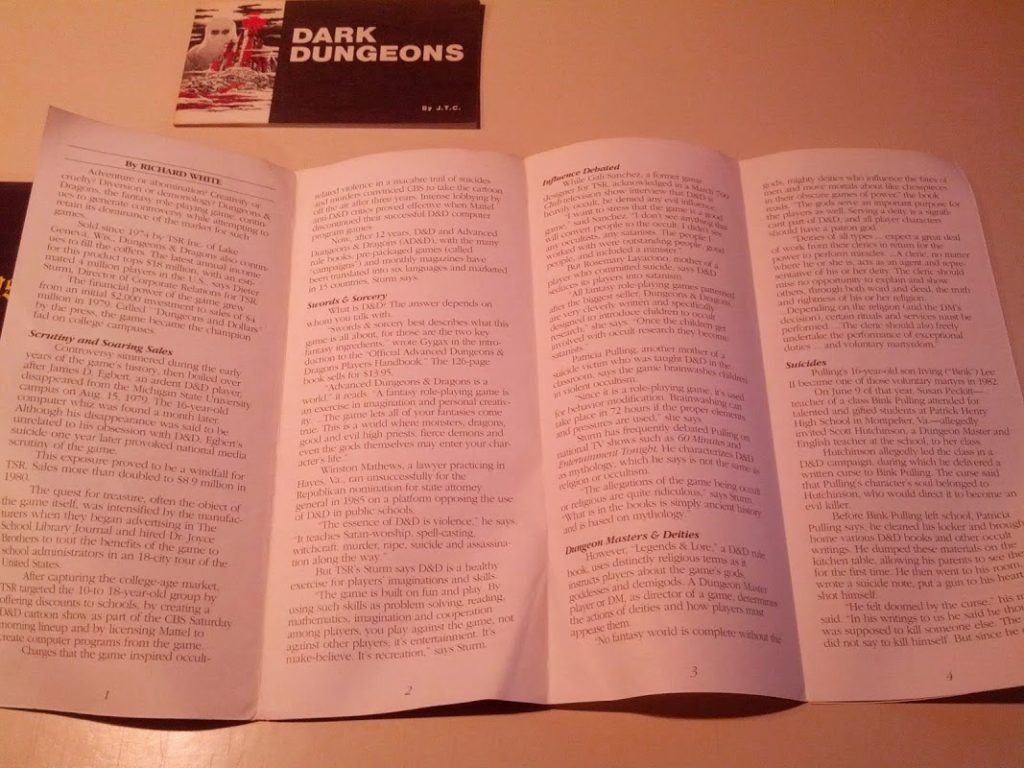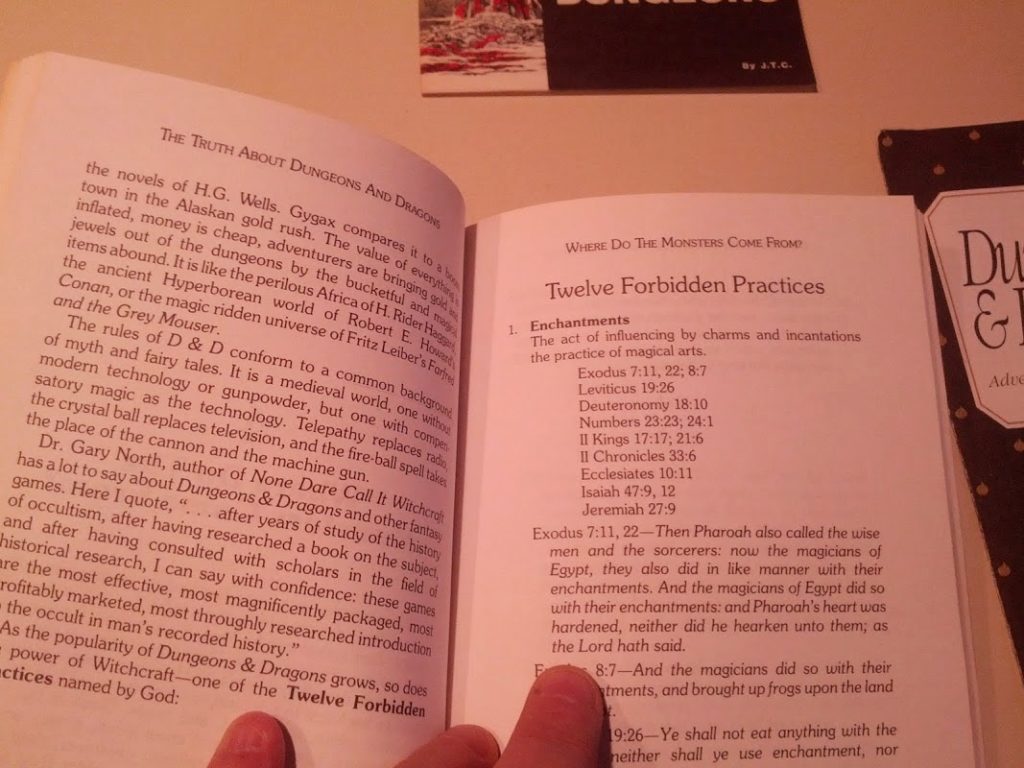Timothy Brannan earlier posted a couple of nifty videos from the 1980’s “D&D is evil” craze. I thought I’d post a few photos of a bit of my own collection of “Satanic Panic” memorabilia, specifically the D&D thingamabobs.
The one at the top, I think we’re all familiar with (“NO! NOT BLACK LEAF! NO! NO! I’M GOING TO DIE!”). And the 80’s clothes are spot-on. But the one on the right (subtitled “Adventure or Abomination?”) was published by Pat Robertson’s Christian Broadcasting Network back in 1992. It’s just a pamphlet, but you can hopefully read at least part of it below:
“The Truth About Dungeons & Dragons” is a much more substantive work (91 pages, published in 1991). Here’s a page taken at random:
Heh. I’ll spare you the more Pagan or Satanist oriented pieces of my collection (books like Painted Black), but some day I might recount my time as a featured guest on Talk Back with Bob Larson. 🙂












That's silly. D&D isn't evil, at least for level 1-3 types. Wait until you get to high levels and start to interact with demons and devils.
"That's where the real power is!"
Are they just ignorant or plain stupid?
@Petras All of the above.
Willfully ignorant. Although this doesn't exclude the possibility that these pamphleteers are dumb like rocks.
I used to have a copy of the Chick Tract Dark Dungeons, but lost it in one of my moves to or from college.
I NEED to hear these stories about Bob Larson. I used to listen to Talk Back twice a day, because of some of the loons that were on there. This show made the original Art Bell Coast To Caost look tame by comparison. My favorite was the lead singer from… Deicide?, who used to phone in so Bob could engage in "spiritual warfare" with the demon that possessed him over the phone. Good times.
I'm going to be a semi-contrarian and say the trailing page of the book in the bottom paragraph isn't exactly untrue.
Certainly the first two paragraphs are hard to argue. I can't make any statement as the the first sentence fragment lack the full sentence but the first paragraph is pretty much straight out of the DMG. The second is a fairly accurate description down to the point about magic as tech which has been an anti-D&D complain since Chivalry & Sorcery if not earlier.
It is the third paragraph that will probably elicit laughter but even there it isn't exactly out on a limb although it is overblown. It's thesis, that D&D provides a marketing package for occult knowledge, is arguably true in a sense.
Ask yourself, how many gamers have read Issac Bonewits were it not for D&D, at least indirectly. Had he not be cited in C&S would SJG have republished his book. How many gamers own the occult oriented books such as those recommended by Ken Hite in his book lists if not for games?
I know for me the answer would probably be no. Fantasy literature does not invite digging into the topic in the manner gaming does. Of course, the reason I say that is different than the author's reason. He is arguing a seduction of the innocent type case while I'm arguing the need for rules, the need to codify. I read these items to design better games. I suspect fantasy authors do as well because they need the grounding to write better stories.
It is only in the final paragraph that the author goes off the rails. He does so by using a common logical error/tactic: the assertion that X implies Y automatically. While gaming lead me to read some Bonewits and other I'm not a pagan/Wiccain/whatever term we'd like to use (I'm a member of an Orthodox parish if it matters).
However, gaming did lead me to read such books just as Traveller lead me to gain a deeper understanding of vectors long before high school physics and D&D lead to a deeper knowledge of western Europe in the Middle Ages, especially Anglo-Saxon England and the First Crusade and hex and chit wargaming lead me to read books on strategy, tactics, and military history.
Dark Dungeons is easy to ridicule because it deviates from observable behavior early and obviously. The Truth About Dungeon and Dragons, at least the observed portion, does not. In that portion it has an argument as strong as many newspaper editorials and blog posts and better than most TV news (who this reflects well or poorly on is left to the reader). The proper reaction is not ridicule but to actually engage the author's argument, call out the gap, and then point out that the side effect he describes goes well beyond the occult or even beyond D&D players.